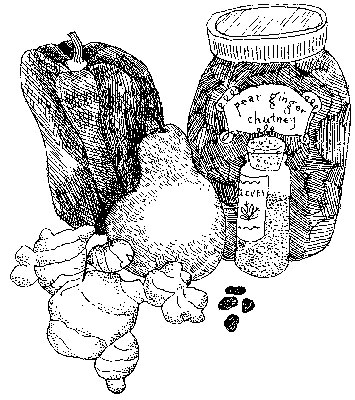 |
| Toki Oshima drawing |
By Roberta Bailey
The first year that I lived in Maine, I gardened on a neighboring farm. Along with plowing up the plot, the farmers showed me how to turn the heel of a knitted sock and how to make pickles. We picked an impressively large patch of cucumbers, washed them and the jars, and spent the rest of the afternoon making pickles. I still use those recipes: dill pickles, mustard pickles and a half dozen others that I carefully copied onto index cards. (And I still turn a heel the way Diane Ward taught me.)
Pickling and brining have long been easy ways to preserve food. The Chinese invented the process and the Pennsylvania Dutch made pickles a part of every meal with their ‘seven sweet and seven sours’. Once an important part of surviving a long winter, pickles, chutneys and relishes now fill the role of interesting condiments and spicy additions to our meals. (How many people these days would decide to pickle watermelon rind?) Anything can be pickled, from immature vegetables to big yellow cucumbers and green tomatoes, from cranberries to crabapples, from horseradish to garlic tops, from cabbage to rutabagas and daikons.
In spite of urges to share my favorite kosher dill or dilly bean recipes, I chose more obscure recipes. Limiting it to a few was very hard. Try a dilly bean brine with baby carrots, garlic scapes, cauliflower or mushrooms.
Please consult a canning/pickling book for complete instructions on how to pickle and process canned foods.
Ginger Pear Chutney
10 c. (5 pounds) sliced, firm, ripe pears
1/2 c. finely chopped green peppers
1-1/2 c. seedless raisins
4 c. sugar
1 c. chopped, crystallized ginger
3 c. cider vinegar
1/2 tsp. salt
1/2 tsp. whole allspice
1/2 tsp. whole cloves
3 cinnamon sticks, 2 inches long
Place pears and the next six ingredients in a stainless, enamel or glass saucepan. Tie spices in a cheesecloth bag. Cook slowly until pears are tender and the mixture is thick, about 1 hour. Remove spices. Ladle into hot, sterilized jars, leaving 1/2-inch headspace. Adjust caps. Process for 10 minutes in a boiling water bath. Yields 10 half pints.
Horseradish Relish
1 lb. well-scrubbed horseradish roots
1-1/2 c. white or cider vinegar
1 tsp. sea salt
Chop the roots into 1″ to 2″ pieces. Chop in a food processor or blender, or grind in a food mill. Try not to breathe the vapors; they are very, very strong. Add vinegar to desired consistency. Add salt. (Vinegar will be needed to help blend, in some instances.) Store in a sealed jar in the fridge. Do not water bath: Cooking horseradish removes its heat.
Jean Ann Pollard’s Pickled Hot Spiced Jerusalem Artichokes
(from The Simply Grande Gardening Cookbook, Burford Books, 2001, reprinted with permission of the author.)
Scrub well, peel and slice:
1-3/4 lb. sunchokes
Scald 4 pint jars, rings and lids and set them on a towel to dry.
Into each pint jar, place:
1 dried red pepper
1 bay leaf
1 large clove garlic, peeled
5 peppercorns
1/4 tsp. mustard seed
In a small porcelainized or stainless steel saucepan, bring to a slow boil:
3 c. distilled white cider vinegar
1 c. light colored maple syrup
2 tsp. powdered turmeric
Place the sliced sunchokes into each jar to within 1/2 inch of the top. Fill to cover with the hot vinegar solution. Wipe the rims and seal the jars. Process in a boiling water bath for 10 minutes. Makes 4 pints.
Cucumber Oil Pickles
1 Tbsp. peppercorns
2 Tbsp. mustard seed
2 Tbsp. celery seed
8 c. vinegar
2 quarts ice cubes
25 medium pickling cucumbers, washed, dried and thinly sliced
2 medium onions, thinly sliced
1 c. light colored maple syrup
1/2 c. olive oil
Place peppercorns, mustard seed and celery seed in a cheesecloth bag and place this in a stainless steel pot with vinegar and ice cubes. Add sliced cucumbers and onions. Let the mixture stand all night in a cool place. The next day, drain, reserving the liquid.
Place the liquid in a kettle, add maple syrup and oil; add drained cucumbers and onions. Simmer until the cucumbers change color, then bring the mixture to a boil.
Pack the pickles into hot, scalded pint jars. Pour hot liquid over the cukes, leaving 1/4-inch head space. Seal and process the jars for 10 minutes in a boiling water bath. Makes 7 to 8 pints.
Pickled Spring Onions and Snap Peas
2 lbs. small, white onions
2 lbs. snap peas, de-stemmed
8 spears horseradish root (optional)
8 cloves garlic
1/4 c. olive oil
6 c. vinegar
4 c. water
1 tsp. salt
4 tsp. maple syrup
Pack trimmed and skinned onions with snap peas into sterilized pint canning jars, leaving 1/2-inch head space. Add one clove of garlic and one spear of horseradish to each jar, tucking them into the peas and onions. In a stainless steel pot, heat the vinegar, water, olive oil, salt and maple syrup. Bring to a boil, then pour the liquid into the canning jars, covering the vegetables, and leaving 1/4-inch head space. Seal and process in a boiling water bath for 10 minutes. Yield: 8 pints.
About the author: Roberta cooks and knits in Vassalboro, when she isn’t working at Fedco Seeds.
This edition of the Harvest Kitchen was originally published in the Summer 2002 issue of The Maine Organic Farmer & Gardener.
Looking for more seasonal recipes? Sign up for MOFGA’s Local and Organic Kitchen Newsletter.
